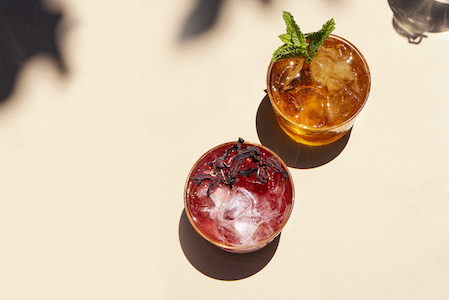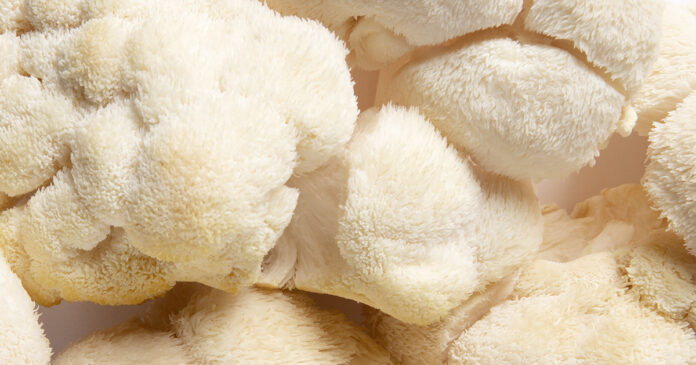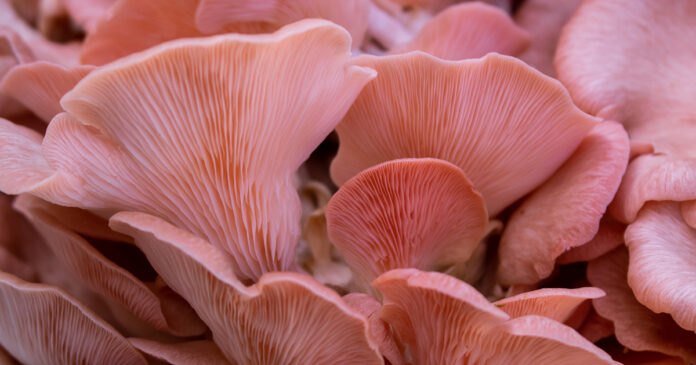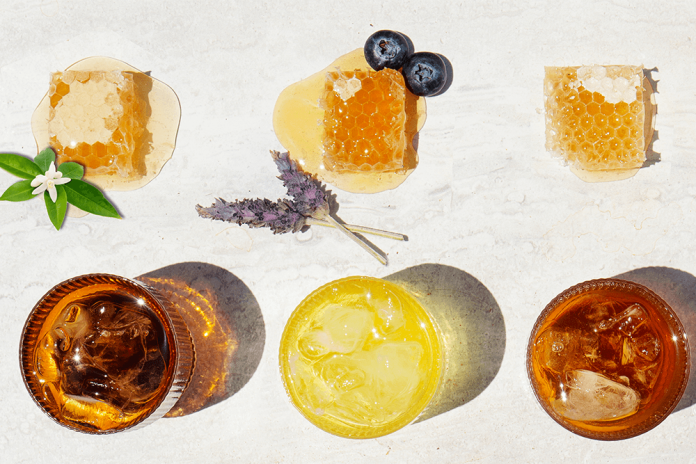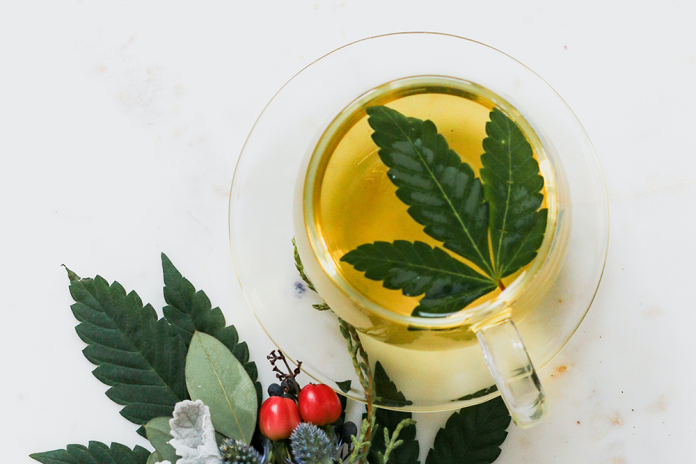So you’ve been hearing about the awesome potential health benefits of drinking tea daily.
But maybe you’re wary of the caffeine in tea?
Decaf tea might seem like the logical solution, but it has some downsides that you might not be aware of.
Plus, “decaf” doesn’t even mean “caffeine-free.”
Huh?!
Let’s talk about what decaf tea is, why you may not need to “go decaf,” and what your TRUE caffeine-free tea options are…
Why “decaf” is NOT “caffeine-free”
Tea that is decaffeinated has undergone processing to reduce its naturally-occurring caffeine. All true teas–black, green, oolong, white, and pu’er–naturally contain caffeine.
However… it’s impossible to remove all the caffeine during decaffeination, which is why decaf tea is never completely caffeine-free.
By law, anything labeled “decaf” cannot contain more than 3% of its original caffeine content. A cup of decaf tea might contain anywhere from 1 to 4 milligrams of caffeine. Negligible to most, but worth noting for those who are particularly caffeine sensitive or looking to quit it completely.
“Caffeine-free” teas, on the other hand, naturally have zero caffeine. These are called herbal teas, or tisanes, and they are made from dried flowers, herbs, leaves, seeds, or roots. Technically, they aren’t “true” teas since they don’t contain leaves of the tea plant (Camellia sinensis).
How is tea decaffeinated?
Commercially, tea is decaffeinated one of three ways:
1. Chemical Solvents
The most common decaffeination method involves soaking tea leaves in a chemical solvent–either ethyl acetate or methylene chloride.
Teas decaffeinated with ethyl acetate are often labeled “naturally decaffeinated” because this chemical compound is derived from fruit. Buyer beware, however… in high concentrations, this FDA-approved food additive might impair the central nervous system, liver, and kidneys.
The other solvent, methylene chloride, is an industrial compound used in paint removers, pharmaceuticals, and aerosols. Recognized as a potential carcinogen by OSHA, the FDA permits it as a food additive in small amounts.
No one really knows how much of these solvents, if any, remain on the tea leaves after processing. Something to consider if you are concerned about chemical exposure…
2. CO2
Carbon dioxide decaffeination infuses water with CO2 in high-pressure tanks.
CO2 is a naturally-occuring chemical compound. You encounter it every day–it’s a greenhouse gas in the atmosphere and it’s what plants convert into oxygen. It’s also what comes out of your lungs when you exhale.
This is the only approved decaffeination method for “Certified Organic” decaf teas.
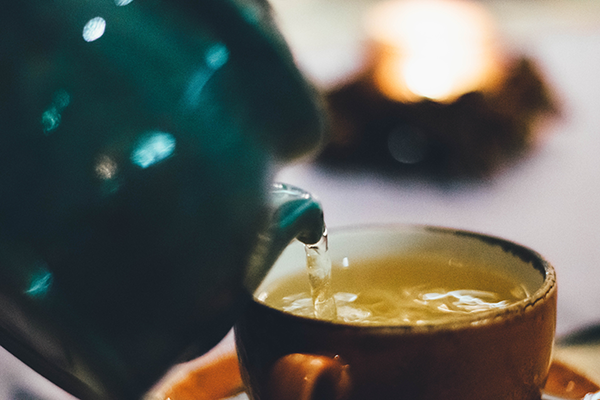
3. Hot Water
Hot water can also strip caffeine from tea, though this method is rarely used.
Possibly because it doesn’t remove caffeine as effectively as other methods. One study showed it only reduced the amount of caffeine in green tea by 83%, 10% shy of the requirement for a “decaf” label. (5)
Plus, this method isn’t suitable for decaffeinating black tea. (6)
Now that you know how tea is decaffeinated, you may have some reservations about decaf tea. The good news is, you may not need to go decaf at all…
Do you even need to go decaf?
We are a caffeine-fueled society, with many people drinking far more than the recommended daily maximum–400 milligrams. That’s only 2 cups of strong coffee, after all.
Of course, it would take 8-10 cups of black tea–and even more green tea–to reach 400 milligrams of caffeine. Coffee drinkers may find that simply replacing coffee with regular tea automatically puts their caffeine intake in a healthier range.
It’s important to know, the caffeine in tea doesn’t affect your body the same as coffee. So, if you’re afraid that black tea, or the oh-so-popular matcha, will give you caffeine jitters or withdrawal symptoms, well, they’re not very likely to do so.
There are two reasons for this: 1) cup-for-cup, tea has less caffeine than coffee and 2) tea contains l-theanine, a unique amino acid that affects how your body absorbs caffeine, giving it almost more of a time-released effect. L-theanine promotes a feeling of calm, focused energy. (7) In other words, the opposite of the coffee jitters.
Decaf and caffeine-free tea: pros and cons
Still want to explore your decaf and caffeine-free options? Cool, let’s dive in…
Decaffeinated Teas
While any true tea can be decaffeinated, it’s hard to find anything other than black and green decaf teas sold commercially. That’s probably just a supply and demand thing.
Decaf tea is sold both as loose leaf and ready-to-go tea bags, as well as in blends, like Earl Grey or chai tea.
What’s great about decaf tea is that tea drinkers can enjoy their favorite tea type without the caffeine boost (unless you’re really caffeine-sensitive). For die-hard green or black tea lovers who want to sip their brew right up until bedtime, this is a major selling point.
Unfortunately, there are downsides to decaf. For starters, the decaffeination process changes the flavor of tea. Caffeine is naturally bitter, so even the best decaffeination methods alter the taste of the tea by removing this flavor element.
Another concern is that packaging usually doesn’t disclose the decaffeination method. To avoid chemical solvents, you have to call the manufacturer, or try to remember their sneaky labeling tricks: “naturally decaffeinated” is usually chemical solvent decaffeination, while “certified organic” can only mean CO2 decaffeination.
The biggest disadvantage of decaf tea is that it may not have the same health benefits as regular tea. Specifically, decaffeination may destroy a large portion of polyphenols and antioxidants. More on that later…
Caffeine-free tisanes (herbal teas)
This is where tea really shines in the caffeine-free beverage category. The list of herbal teas is as long and diverse as it is good for your health.
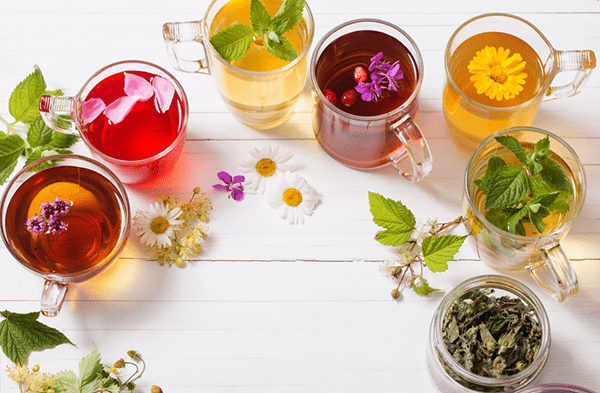
Nature’s bounty of herbs, spices, and roots can be enjoyed alone, or in delightful combination as an herbal infusion. Some of the most popular are chamomile, ginger, peppermint, cinnamon, and hibiscus.
Another popular herbal tea is red rooibos, made from African red bush leaves. Its full-bodied flavor profile and warm nutty notes makes it a great, naturally caffeine-free substitute for black tea.
You can use red rooibos as the base for a caffeine-free English Breakfast or chai blend, or just enjoy it straight as you would black tea or coffee.
And if all of this sounds like a foreign language because you are brand spankin’ new to the world of caffeine-free tisanes, a great place to start is with an herbal tea sampler. You can try a variety of flavors in any form you fancy: loose tea, tea bags, or our very own herbal tea crystals.
Health benefits
One of the biggest health perks of regular tea is its polyphenols. These plant compounds are a type of antioxidant, known to have powerful vitalizing and anti-inflammatory properties. Polyphenols may also support healthy weight management and digestion, due to their prebiotic qualities. (8)
One study showed that CO2 decaffeination of green tea reduced its epigallocatechin gallate (EGCG) content by almost 40%. (9) EGCG, a catechin, is green tea’s most abundant polyphenol, responsible for the bulk of green tea’s health benefits.
Another study suggests that regular green tea might support healthy blood sugar levels, but decaf black tea does not. (10)
Like true teas, herbal teas have been used for centuries for their soothing and health-promoting properties. For example, you may drink chamomile tea to relax, ginger or peppermint to support digestion, cinnamon to support healthy blood sugar, and echinacea or licorice root to support healthy immune function.
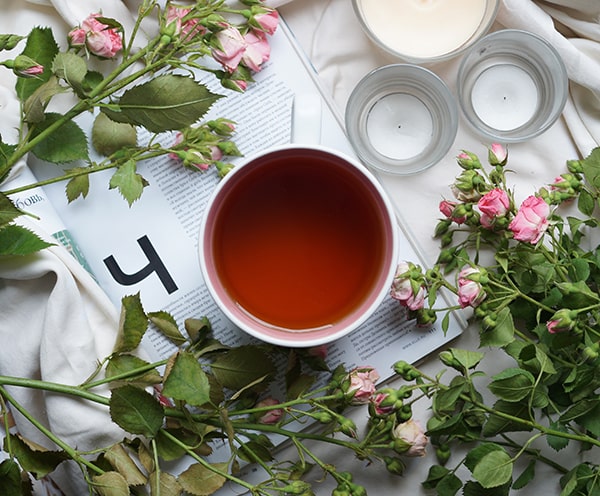
Final Thoughts
Even though caffeine is natural, it can still have adverse effects if consumed in excess.
Luckily, whatever your cup of tea (pun intended!), you can find it with little to no caffeine. For tea lovers, decaf teas or herbal teas are a way to enjoy your favorite beverage while limiting caffeine intake.
Decaffeination, however, may affect the tea’s flavor, reduce its health benefits, and possibly expose you to toxic chemicals.
For maximum health benefits, stick with regular green and black teas and go for naturally caffeine-free herbal teas at night, or whenever you want to avoid caffeine.
